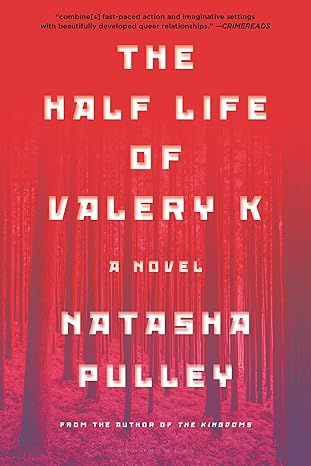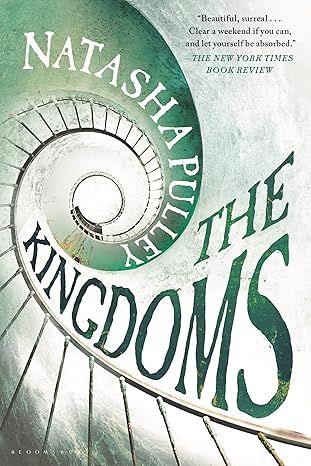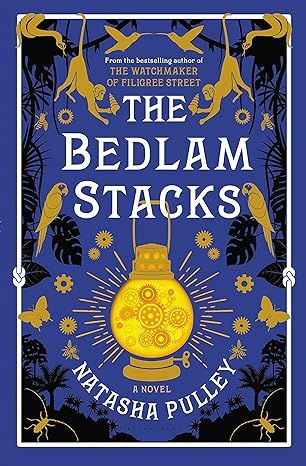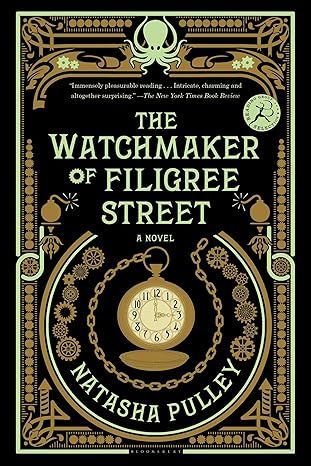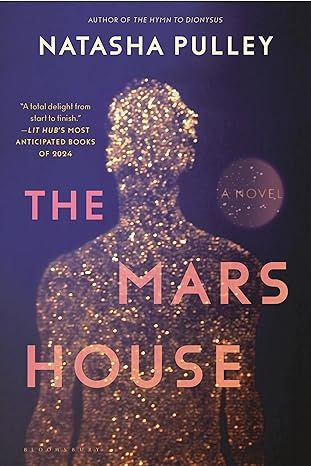The Half Life of Valery KHardcover
4.5
-
909 ratings
“An absorbing Cold War thriller” (Christian Science Monitor) with a slow burn romance at its heart, set in a mysterious town in Soviet Russia.
In 1963, in a Siberian prison, former nuclear specialist Valery Kolkhanov has mastered what it takes to survive: the right connections to the guards for access to food and cigarettes, the right pair of warm boots, and the right attitude toward the small pleasures of life so he won't go insane. But one day, all that changes: Valery's university mentor steps in and sweeps him from the frozen camp to a mysterious unnamed city. It houses a set of nuclear reactors, and surrounding it is a forest so damaged it looks like the trees have rusted from within.
In City 40, Valery is Dr. Kolkhanov once more, and he's expected to serve out his prison term studying the effect of radiation on local animals. His research is overseen by an imposing but surprisingly kind KGB officer, Shenkov, whose trust Valery feels a strong urge to win. But as Valery begins his work, he is struck by the questions his research raises-questions even Shenkov is afraid to answer. Why is there so much radiation in this area? What, exactly, is being hidden from the thousands who live in the town? And if he keeps looking for answers, will he live to serve out his sentence?
Based on real events, and told with bestselling author Natasha Pulley's inimitable style, The Half Life of Valery K is a sweeping new adventure for readers of Stuart Turton and Sarah Gailey.
Kindle
$9.99
Available instantly
Audiobook
$0.00
with membership trial
Hardcover
$18.64
Paperback
$15.60
Ships from
Amazon.com
Payment
Secure transaction
ISBN-10
1639733035
ISBN-13
978-1639733033
Print length
384 pages
Language
English
Publisher
Bloomsbury Publishing
Publication date
March 18, 2024
Dimensions
6.3 x 1.05 x 8.25 inches
Item weight
13.4 ounces
Product details
ASIN :
B09SV53S9Q
File size :
1001 KB
Text-to-speech :
Enabled
Screen reader :
Supported
Enhanced typesetting :
Enabled
X-Ray :
Not Enabled
Word wise :
Enabled
Editorial reviews
“Combine[s] fast-paced action and imaginative settings with beautifully developed queer relationships.” ―CrimeReads, Queer Mysteries and Thrillers to Read All Year Long
“Pulley's humorous, heartfelt, and occasionally horrifying tale will stay with you long after the last page.” ―Paste Magazine, Best Novels of 2022
“Provocative, unsettling . . . explosive.” ―Publishers Weekly, starred review
“An absorbing Cold War thriller.” ―Christian Science Monitor
“From state tyranny and crimes against humanity to ingenuity and valor under deadly pressure as well as humor and forbidden love, Pulley's brilliantly conceived, vibrantly realized, and complexly suspenseful tale is all the more resounding in the glare of Russia's recklessness at Chernobyl during its latest, horrific invasion of Ukraine.” ―Booklist, starred review
“Scientific research, KGB shenanigans, queer love, and the heartache of suffering children are just a few of the enriching intricacies Pulley traces with intelligent wit and confident narration. A gifted writer of well-drawn characters, Pulley has given the nuclear noir genre a fresh and stimulating take on Chernobyl-style terror.” ―Library Journal
“Another historical novel written with panache is Rebecca Stott's Dark Earth (4th Estate), the gripping tale of two women who flee to Londinium in 500 AD. It is a novel that puts a female perspective right at the centre of a time period usually dominated by men's stories. I also enjoyed Natasha Pulley's The Half Life of Valery K (Bloomsbury), an engrossing novel set in Siberia in 1963. The story was inspired by some chilling real events after the cover-up of a radiation leak.” ―Independent
“With unexpected twists, a paranoid atmosphere, and a fascinating narrator, The Half Life of Valery K is a superb work of historical fiction and an excellent mystery.” ―Bookpage, Best Mystery & Suspense of 2022
“Pulley's impeccable prose, vivid and shot through with tenderness, lends a glint of lightness to this unsettling story.” ―Daily Mail
“Based on real events in a surreal Soviet city, and told with bestselling author Natasha Pulley's inimitable style, The Half Life of Valery K is a sweeping new adventure for readers of Stuart Turton and Sarah Gailey.” ―BookRiot
“History and imagination collide to stunning effect in this utterly beguiling and addictive novel. Unflinching, darkly funny, and all too easy to believe, The Half Life Of Valery K is the kind of book that haunts the reader long after the last page is turned.” ―Erin Kelly, author of HE SAID/SHE SAID
“Pulley adds to her impressive oeuvre with another exquisite novel. Many of the author's trademarks are on display here: a finely-drawn period setting, a vein of dark humor, a plot blending historical fact and fiction, and a protagonist seeking to do the right thing in the face of a brutal political machine. An illuminating and immersive historical tale.” ―Vaseem Khan, author of THE UNEXPECTED INHERITANCE OF INSPECTOR CHOPRA
“Exhibiting all the storytelling skills that made her earlier books so readable and popular, Pulley also offers a piercing study of how a police state deforms individual psychologies, personal relationships and professional ethics . . . Pulley's broad perspective distinguishes her work from that of more-routine thriller authors. Studded with memorable characters and deepened by its exploration of thorny moral issues, The Half Life of Valery K is gripping popular entertainment with a pleasing intellectual heft.” ��―Wendy Smith
Read more
Sample
1
An Unexpected Departure
Kolyma, Siberia, 1963
Possibly because French made it sound fancy and respectable, the wake-up call for the prisoners was called reveille. In fact it was just one of the guards banging a bit of pipe against an iron bar outside the barracks. If he was in the right mood, the guard would take rhythm requests. On what Valery Kolkhanov didn’t yet know was his final morning, it was ‘Blue Suede Shoes’.
Valery eased himself upright, one hand in the roots of his hair, because it was frozen to the pillow. The hessian blankets crackled; there was frost on the top side of the weave. He touched the rafters, which were just above his head and sparkling too, and bent forward to stretch out his shoulders. Something fluffy scuffled into his lap and squeaked. Boris the sociable rat. Valery stroked his ears in the dark. For reasons known only to himself, Boris stole nails from all over the camp. He gave Valery the latest and then rolled over to have his tummy scratched.
‘Who’s a good rat?’ Valery said, pleased. Everyone used nails as needles for darning, and if Boris brought four or five a month, Valery could get an entire can of condensed milk just by selling them on. He wasn’t sure why Boris had decided he, Valery, ought to get the nails, but he wasn’t in the habit of looking gift rats in the mouth.
He bent his neck to see through the small window beside him. The frost was thick on the inside, blurring the halogen lamp on the camp perimeter. He brushed some off. It was snowing.
There was still a clear forty minutes before the start of the labour shift, and those forty minutes stretched out beautifully. He pulled the physics textbook from under the straw mattress and tipped it to the light of the halogen. He preferred to read over the lessons before he had to teach them to the administrator. He would never have needed to – or, not Before – but lately, he could feel his mind effervescing, like one of those headache-cure tablets in a glass of water. He wasn’t losing memories, it wasn’t as straightforward as that. But it was getting harder and harder to think.
‘God’s sake, you tart, just lie down and keep the warm in …’
This from his bunk-partner, whose name he had forgotten because they rarely spoke. Valery gave him Boris to hold. They didn’t know each other well, but in the winter it was a ridiculous idea to sleep alone.
At the barracks doors, the long bar made a grinding noise as the guard pulled it out from the handles. The doors opened, letting in a blast of frozen air, and the old men on light duties. That was a joke, light duties; the first thing they did in the morning was light the four lamps. The lamps were kerosene. They sent a clean chemical smell across the musty space, which looked like a barn, but stacked with bunks and men instead of hay bales. Valery read for a little while, then closed the book and slid down to the ground, past two other bunks and four other men.
Hay crunched under his boots. Other eyes followed the boots. He was one of only three men in the barracks who had real boots, not tied-on rags.
‘Hand those over,’ someone said, someone new.
Valery pushed his sleeve back to show the tattoos on his arm.
‘Bugger,’ the voice mumbled. ‘Sorry.’
On the way out into the black morning, where the darkness was so viscous it felt like being inside an oil slick, Valery bumped the edge of the barracks door. Someone else was coming in just at the same time and they both misjudged their trajectories. It was a tiny knock, just to the knuckles of his first two fingers, but he got a stab of pain anyway that was probably the bones fracturing. He walked shaking his hand in the frozen air, which was as good as any analgesic. Before long his hand was numb.
Calcium deficiency. Annoying but not scurvy. He was fine. He made himself a cigarette, one-and-a-half-handed.
The way to not sink into self-pity and despair – the way to not die – was to look forward to things. Anything; the tinier the better, because then you were more likely to get it. The patterns of ice on the water barrels, the feeling of holding a hot mug. Anything to stop the onset of the terrible docility that came before you gave up. Collect enough bright things, and it was possible to have a good day.
One of the things Valery looked forward to was cigarettes.
All you had to do was find a newspaper from the stack the guards kept for kindling – it was never Truth or anything anyone would actually read, just local farmers’-market stuff and news about how somebody had hit somebody else’s nephew over the head with a sugar beet – and fold it, one page at a time, into small squares. Then you ripped along the folds. Then you sprinkled tobacco in the middle of a square and rolled it up, tight. The square-tearing had to be precise, or you ended up with something too big that caught fire too enthusiastically and your eyebrows suffered. Valery’s favourite thing was the crossword, because it was exactly the right size. Some people took care to find the pictures of Lenin or Stalin, or other things they hated, like marriage banns or cheese adverts, but it was ideal to do the crossword and then smoke it. That was a lot of mileage from one piece of paper.
He always had a decent amount of tobacco. The Vory saw to that.
Walking was difficult, because the mud had frozen into solid ruts and troughs, tyre tracks, footprints, some deep, but all hard to see by the halo glow of the far-off halogens in the staff quarter. He had to go in fits and starts, waiting for the white scythe of the tower’s rotating searchlight. The camp was quiet at this time, though, so there were no crowds to navigate. In the far distance, from the mines, the whistle of the shift change floated eerie up the hill. Valery breathed smoke into the bitter air, and reminded himself again to be grateful that he was not in the mines. The cigarette moulted firefly embers.
One of the guards at the administration-building door gave him the why-am-I-up-at-four-in-the-morning scowl, and spat to one side. It froze before it hit the ground. Minus sixty degrees.
‘Why haven’t you taken your hat off for us?’ he snapped. There was so much rage in his voice that something else must have gone wrong for him this morning already. He was new. Probably he was as miserable to find himself here as any of the zeks. ‘Five paces before you reach a guard!’
He snatched it off, and then roared, because there was a needle in it, probably the only real needle – not a nail – on Valery’s side of the camp. It wasn’t practical to keep a needle anywhere else. The experienced guards knew that.
There was honest fury in his face, and he lashed out fast with his cattle prod. The electric shock was just as horrible as always, a flash of astonishing pain that zinged right up and down Valery’s ribs. Valery forced himself to stay straight instead of doubling over, his hands clamped so hard behind his back that he could feel his nails gouging half-moons into his palms.
He found himself smiling, because he lived for these moments. He loved it when he had a chance to do a real magic trick. There was joy in finding he still could, real raw joy, because what it meant was there was still some iron in him.
‘The thermometer’s buggered, did you hear?’ Valery said, as if nothing had happened.
‘What?’
It didn’t work if you were big. Valery wasn’t. Most people here shaved their heads because it was easier to keep clean, but he didn’t; there was a curl to his hair that made him look much younger than he really was, and he poured energy into keeping his shoulders open and his resting expression sunny. It was so out of place here that sometimes, if he hit it exactly right, it cast an illusion that they weren’t here at all, but on a street in Moscow, meeting like normal people, with the normal rules.
‘The thermometer on the tower. It’s only saying minus seventeen. What a joke.’
‘What – how does a thermometer go wrong?’
‘Probably someone breathed on it while they were doing the reading.’
‘Yeah, must have,’ the new guard said. He looked confused. ‘Yeah.’ He put the cattle prod back on his belt as if he’d forgotten why he was holding it.
Abracadabra.
The administrator opened the door before Valery had to knock, freshly ironed like always, despite the hour, but looking anxious. His eyes skipped between Valery and the guards. He hated breaking up fights; it was too undignified. ‘Come in then, 745; I’ll make your coffee and you can tell me what you’ve got for me today.’
The heat inside the office was so intense that Valery was instantly too hot. Firewood crackled in the open stove, casting amber light everywhere, nearly as bright as the three gleaming kerosene lamps. He breathed out and let his shoulders sink. It was much easier to inhale in here than it had been outside. The ache down his ribs pulsed.
Valery sat down at the table and skim-read the next section of the textbook for a second time. As the kettle boiled, he touched the dog-eared pages and wondered how much of the science was still up to date. Probably not much. The world would have moved on in six years. One of the upsetting things about any sort of science was that it had about the same half-life as radioactive caesium; after thirty years, at the most, fifty per cent of it turned out to be wrong.
‘By the way,’ the administrator said, bringing across the coffee, ‘today’s your last day.’
Something like snow, something heavy and cold, settled over Valery’s mind. If he was going to be led away into the woods and shot tonight, then he hadn’t done a single useful thing in his life.
‘Yes,’ the administrator continued, ‘you’re being sent somewhere else.’
Valery would have been less surprised if the ceiling had fallen in. ‘I’m what, sorry?’
‘I’ve got a transfer order for you. Not sure where, funny name, I didn’t recognise it. Kyshtym mean anything to you? Me neither. Anyway, I’m supposed to put you in a car later this morning.’
‘In …’ Valery trailed off, unable to speak. At some point in the last few years, one he couldn’t find now he was looking for it, the world beyond the camp had taken on the feeling of something imaginary – like the Winter King’s house, or the grove of silver trees where the dancing princesses danced.
There was no point asking why; the administrator wouldn’t know. Valery poured milk into the coffee. It was another of the things he looked forward to, watching it. The spinning patterns were hypnotic.
A transfer order. If the government had remembered his name, it wouldn’t be for anything good. It would be because they had realised he had never been properly interrogated. They had noticed, finally, that there might be some useful information sitting in his weakening skull.
It had all been a bit rushed on the day he’d been arrested. They’d had dozens of names to get through at the Lubyanka that morning, and the police had been quite grateful when he’d told them that yes, he’d definitely done whatever it was they had on their list, and they could tick him off straight away thank you, no need to show him the chair with the straps.
‘Well? Drink your coffee,’ the administrator said.
Valery drank it.
The worst possible approach was to complain. It wasn’t because the entire camp administration was evil; they weren’t. But if someone complained about normal life, the overwhelming human instinct was to kick them in the head. It was exactly the same feeling that Valery had used to have when he overheard some morose and paunchy faculty member whingeing about how a younger woman was ignoring him.
If you wanted help, you had to let someone arrive at that conclusion alone. You had to make the outline, but never fill it in. He had all morning; maybe he could do it.
‘Oh,’ said the administrator, annoyed. ‘The car’s early.’ He was looking out the window.
A prison transport van was just pulling in through the camp gates, below the wrought-iron archway sign that said, WORK IS HONOURABLE, GLORIOUS, VALIANT, AND HEROIC.
‘Right, well. Off you go, I suppose. Come along.’
Numbly, Valery followed the administrator as he bustled out to the courtyard, the concrete pink now in a dawn that had cathedrals in the clouds. The van was big enough for twenty people in the back, but when the administrator helped him in, Valery was the only one, except for a woman in a KGB uniform, reading a newspaper. The administrator shackled his hands to the wall on a considerately long chain, patted his shoulder, then shut the doors with a clang, which left Valery in the windowless metal cabin with nothing but the KGB lady and a light bulb screwed sideways into the ceiling. Someone banged on the side of the truck, and it rumbled off.
He lost his sense of time. After a while, the KGB lady tipped the newspaper at him to ask if he wanted to read it. He nodded, and stared uncomprehendingly at the front-page articles. It had been six years since he had last seen a copy of Truth. They’d changed the font. He read slowly, unable to shake the feeling that he was doing something forbidden. It was all ordinary stuff; the economy, a Lenin Day parade in Moscow, a nicely staged picture of banners and crowds and tanks in Red Square. He read everything, including the weather and the classifieds at the back, and had a strange, untrustworthy warm feeling that after so long away from it all, the world was holding one hand out to him again. When he noticed the feeling, he shut the paper. It was dangerous to start wanting things like that.
He wanted to ask the KGB lady about where they were going, but he couldn’t bring himself to. She wouldn’t tell him anyway, and if she got angry, she had a baton at her hip. Even though he was only imagining an angry person, not dealing with one, the burn from the cattle prod ached down his ribs again and his heart started to buzz.
He was still working up the courage to try when they stopped. She opened the back doors, and daylight javelined in.
Read more
About the authors
Natasha Pulley
Natasha Pulley was born in Cambridge. She read English Literature at Oxford before doing an MA in Creative Writing at the University of East Anglia. In 2013 she went to Japan on a scholarship from the Daiwa Anglo Japanese Foundation. She lived in Tokyo for a year and a half, learning Japanese and researching her first book, 'The Watchmaker of Filigree Street'. She spent several months in Peru courtesy of a travel grant from the Society of Authors, chasing llamas and researching 'The Bedlam Stacks', and more recently, spent some time in Shanghai studying Mandarin for 'The Mars House'. She lives in Bristol.
Read more
Reviews
Customer reviews
4.5 out of 5
909 global ratings
Natalie
5
amazing, moving book.
Reviewed in the United States on May 15, 2024
Not sure what genre it is—thriller, mystery, but it’s deep and frightening and sad, with, impossibly, hope mixed in. The characters seem alive, complicated and simple just like real people, and motivated to different actions by extremes of experience.
Kindle Customer
5
Jumping the gun a bit but...
Reviewed in the United States on November 2, 2022
Verified Purchase
I'm not quite 20% through this book but I am already entranced and so delighted to have something new from this author. IMO the worst thing to happen when you are reading a story is to find that you have no empathy with any of the characters (see: Wuthering Heights). I never have this concern when reading Pulley's books--I have read all of them--and her love stories are so beautifully constructed. It was quite a treat to stumble across Valery K.
Read more
5 people found this helpful
Jane
5
One of my favorite books of the year
Reviewed in the United States on December 24, 2022
Verified Purchase
Amazing characters and a story that I could not stop reading.
M. A. Wolfson
5
Another Very Human Story with Artificial Intrique
Reviewed in the United States on March 9, 2024
Verified Purchase
Natasha Pulley has a lovely way of telling stories about the human need to be held set in historical stage sets. The suspense and intrigue are just tools to allow the characters to express fear, longing and the need for love. The fact that they are very subtle queer stories opens a question whether this subtlety is a brilliant way to expose the communality and essential humanity of queer love or a cynical way to appeal to a larger audience. As a queer man the resonance with the characters feels genuine so I will give her the benefit of the doubt given the historical nature of the novel. Valery’s world requires he live is the shadows. Like any greedy reader I want more time with these characters.
Read more
Morgan Miller
5
Amazing story!
Reviewed in the United States on March 7, 2024
Verified Purchase
Immersive, fast paced, and so intriguing. The characters are so real you can’t help but love them.
Top Natasha Pulley titles
View allBest Sellers
View all
The Tuscan Child
4.2
-
100,022
$8.39

The Thursday Murder Club: A Novel (A Thursday Murder Club Mystery)
4.3
-
155,575
$6.33

Sapiens: A Brief History of Humankind
4.6
-
140,302
$13.49

The Butterfly Garden (The Collector, 1)
4.3
-
88,556
$9.59

Things We Hide from the Light (Knockemout Series, 2)
4.4
-
94,890
$11.66

The Last Thing He Told Me: A Novel
4.3
-
154,085
$2.99

The Perfect Marriage: A Completely Gripping Psychological Suspense
4.3
-
143,196
$9.47

The Coworker
4.1
-
80,003
$13.48

First Lie Wins: A Novel (Random House Large Print)
4.3
-
54,062
$14.99

Mile High (Windy City Series Book 1)
4.4
-
59,745
$16.19

Layla
4.2
-
107,613
$8.99

The Locked Door
4.4
-
94,673
$8.53
